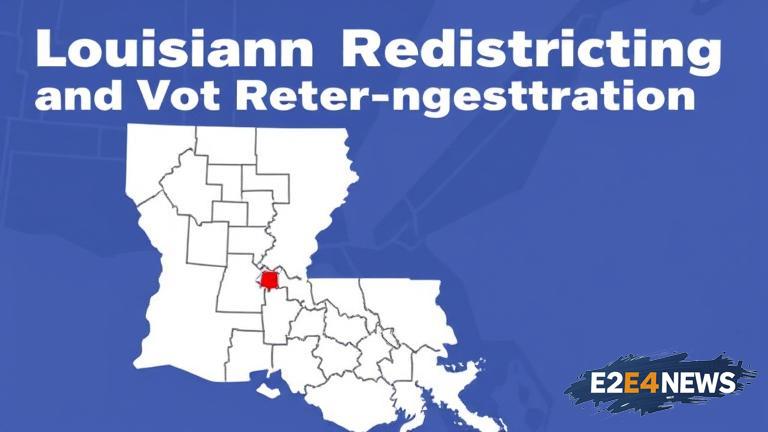The state of Louisiana is currently undergoing significant changes in its congressional redistricting process, which has sparked intense debate and discussion among lawmakers and citizens alike. The redistricting process, which occurs every decade, aims to redraw the state’s congressional maps to reflect changes in population and ensure fair representation. However, the process has been marred by controversy, with some arguing that the proposed maps favor certain political parties or interests. Meanwhile, the Louisiana National Guard has been involved in efforts to increase voter registration in the state, with Guardsmen participating in voter registration drives and outreach programs. This move has been seen as a positive step towards increasing civic engagement and participation in the democratic process. Despite these efforts, voter registration numbers in Louisiana remain lower than in other states, with some citing barriers to registration, such as strict ID laws and limited access to registration resources. The redistricting process has also raised concerns about gerrymandering, with some arguing that the proposed maps are designed to favor certain politicians or parties. The Louisiana Legislature has been working to finalize the new congressional maps, with lawmakers considering various proposals and amendments. The process has been marked by intense partisan debate, with Democrats and Republicans disagreeing on key aspects of the maps. The redistricting process has significant implications for the state’s political landscape, with the new maps set to shape the course of future elections. The involvement of the National Guard in voter registration efforts has been seen as a positive step towards increasing civic engagement, but some have raised concerns about the potential for partisanship or bias. The state’s voter registration laws have been the subject of controversy in recent years, with some arguing that they are too restrictive or burdensome. Despite these challenges, many Louisianans are working to increase voter registration and participation, with grassroots organizations and advocacy groups leading the charge. The redistricting process has also highlighted the need for increased transparency and accountability in the state’s political process, with some calling for greater oversight and scrutiny of the map-drawing process. As the redistricting process moves forward, it remains to be seen how the new congressional maps will shape the state’s political landscape. The involvement of the National Guard in voter registration efforts is a positive step towards increasing civic engagement, but more work is needed to address the underlying barriers to registration and participation. The state’s lawmakers must work to ensure that the redistricting process is fair, transparent, and accountable to the people of Louisiana. The future of the state’s democracy depends on it. The redistricting process has significant implications for the state’s political landscape, and it is essential that lawmakers prioritize fairness, transparency, and accountability. The people of Louisiana deserve nothing less. The state’s voter registration laws must be reformed to make it easier for citizens to register and participate in the democratic process. The National Guard’s involvement in voter registration efforts is a step in the right direction, but more work is needed to address the underlying barriers to registration and participation. The redistricting process must be transparent and accountable to the people of Louisiana, with lawmakers prioritizing fairness and equity above all else. The state’s democracy depends on it. The future of Louisiana’s political landscape will be shaped by the redistricting process, and it is essential that lawmakers get it right. The people of Louisiana are counting on it.
